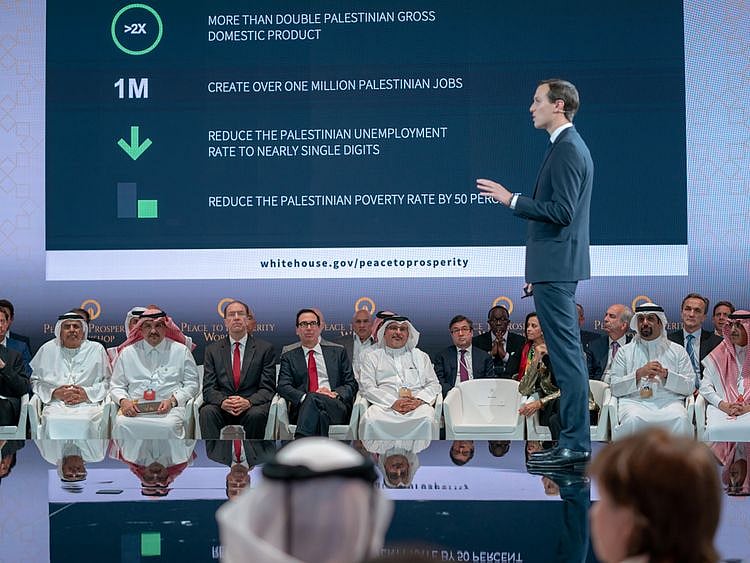Manama, Bahrain: Stability and security are critical to the success of a $50 billion US economic plan for the Palestinians that focuses entirely on infrastructure and development, omitting political aspects that are key to resolving to long-running Israeli-Palestinian conflict, international financial chiefs and global investors said Wednesday.
While welcoming the American initiative led by President Donald Trump’s son-in-law and senior adviser, Jared Kushner, panelists at a conference in Bahrain aimed at boosting the ambitious plan said it would struggle without good governance, rule of law and a realistic prospect of lasting peace.
The Palestinians have already rejected the proposal because it does not include acknowledgement of their political demands, including an end to Israeli occupation and the creation of an independent state.
Despite the absence of those issues from the proposal and the Trump administration’s refusal to endorse a two-state solution that has long been seen as the only viable path to peace, panelists sprinkled their comments with repeated references to “Palestine,” a “country” and a “nation-state.”
Those words have not featured in US officials’ comments about a resolution to the conflict since Trump became president in 2017 and began cutting aid and political support to the Palestinians in what critics have cited as the US administration’s pro-Israel bias.
Christine Lagarde, the managing director of the International Monetary Fund, suggested that peace is the missing piece of the proposal.
The Palestinians have great economic potential that can only be fulfilled with serious reform and protections for investors that must include serious anti-corruption efforts. But those alone are not enough, she said, stressing that a “satisfactory peace” is imperative for prosperity.
“It’s a matter of putting all the ingredients together,” Lagarde said.
“Improving economic conditions and attracting lasting investment to the region depends ultimately on being able to reach a peace agreement,” she said in a statement released by the IMF after her comments.
“Peace, political stability, and re-establishment of trust between all the parties involved are essential pre-requisites to the success of any economic plan for the region.
Kushner’s “Peace to Prosperity” proposal depends heavily on private sector investment in the West Bank, Gaza as well as Egypt, Jordan and Lebanon, where it envisions creating a million new jobs, cutting Palestinian unemployment to single digits, doubling the Palestinian gross domestic product and reducing the Palestinian poverty rate by 50% through projects in health care, education, power, water, tourism, transportation and agriculture sectors.
The plan acknowledges that its success hinges on the completion of a long-elusive Israeli-Palestinian peace deal. But that necessity was driven home by participants at the two-day workshop in Bahrain.
“You are going to have to deal with the political thing in order to get investment,” said Daniel Mintz, a founder of Olympus Capital Asia.
“Stability and security is key to investment in every country where we go,” said Selim Bora, the president of the Turkish investment firm Summa.
“Things don’t have to be perfect, but we have to have a minimum level to go in.”
Others said the plan could not succeed without the Palestinians having rights and dignity within their own state.
Neither Israel nor the Palestinians are represented by official delegations and many Arab nations that are attending the gathering in Bahrain have sent lower-level officials in a sign of their skepticism of the plan.
Also speaking at the conference on Wednesday were former British Prime Minister Tony Blair, the head of the international football federation FIFA Gianni Infantino, and the lone Palestinian on the agenda, a West Bank businessman who is viewed with deep suspicion by many fellow Palestinians.
Infantino, who participated in the event despite a last-minute direct appeal from the Palestinians to reconsider, said he was hopeful that sports, particularly soccer, could have an important role in giving hope to Palestinian communities and improving relations with Israel.
“With football, though football, we can really build bridges,” he said in a discussion about using sport and entertainment as catalysts for development. “Let’s use football as tool to show what is possible. We play footoball in Palestine, we play football in Lebanon, it is possible. Football can play a little role, but an important one.”
Infantino’s co-panelist, film producer Fernando Sulichin, spoke of the need to change the narrative of “Palestinian victimization” through entertainment. “We need to stop the victimization and start telling new stories.”
He suggested there could be a “Black Panther” or “Billy Elliott” hero for the Palestinians or an uplifting story like “Roma,” the Academy Award winning film about the life of a live-in housekeeper of a middle-class Mexican family.
“Why don’t we have a ‘Roma’ in Palestine?” he asked.
Palestinians on Tuesday protested against the plan, even as Kushner opened the Bahrain conference with a direct appeal for them to consider it.
Sign up for the Daily Briefing
Get the latest news and updates straight to your inbox
Network Links
GN StoreDownload our app
© Al Nisr Publishing LLC 2026. All rights reserved.
